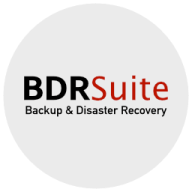

BDRSuite Backup & Replication and Dell RecoverPoint for Virtual Machines compete in virtual environment backup solutions. BDRSuite has a competitive edge with user-friendly interfaces and cost-effective features, while Dell excels in advanced integration and real-time data protection.
Features: BDRSuite is noted for ease of use, automated backups, and effective compression ratios. Its intuitive setup and comprehensive feature set are highly regarded. Dell RecoverPoint stands out with real-time data protection, point-in-time recovery, and local and remote protection, crucial for minimizing downtime.
Room for Improvement: BDRSuite needs improved support service, integration, and more intuitive features. Time zone issues often delay support responses. Dell RecoverPoint faces high cost concerns and suggestions for easier deployment and enhanced servicing. Users desire better interface and cloud capabilities.
Ease of Deployment and Customer Service: BDRSuite supports deployment across various environments but initial setup is cumbersome for some. Its customer service experiences delays and language barriers. Dell RecoverPoint offers straightforward on-premises deployment but is criticized for complex setup and lack of responsive support. Both need service and support improvements.
Pricing and ROI: BDRSuite is seen as cost-effective with flexible licensing, appealing to businesses with tight budgets. It offers potential cost savings, though clarity in licensing is suggested. Dell RecoverPoint is considered a premium product with higher pricing, suitable for larger enterprises. It provides justifiable ROI through substantial time savings and reliable protection for some users.
| Product | Market Share (%) |
|---|---|
| BDRSuite Backup & Replication | 1.7% |
| Dell RecoverPoint for Virtual Machines | 3.9% |
| Other | 94.4% |


| Company Size | Count |
|---|---|
| Small Business | 44 |
| Midsize Enterprise | 15 |
| Large Enterprise | 10 |
| Company Size | Count |
|---|---|
| Small Business | 5 |
| Midsize Enterprise | 4 |
| Large Enterprise | 6 |
BDRSuite by Vembu offers comprehensive and cost-effective Backup and Disaster Recovery software tailored to meet the diverse data protection requirements of Businesses and Service Providers. BDRSuite provides robust backup solutions for a wide range of IT workloads, including virtual machines, servers, endpoints, SaaS applications, cloud VMs, NAS/File Shares, and databases & applications. It offers the flexibility to store backups anywhere and centrally manage the entire backup infrastructure.
BDRSuite is designed to help businesses keep their data secure and ensure it is easily recoverable in the event of data loss or ransomware attacks. With BDRSuite, businesses can achieve reliable data protection and ensure business continuity – all at an affordable price.
Download BDRSuite's 30-day Free Trial Here.
PRICING DETAILS
VMs, Servers & Cloud Backup at $48 per workload/year (VMware, Hyper-V, KVM, oVirt, Proxmox, Windows, Linux, AWS, Azure, File Share-500 GB)
Endpoint/Workstation Backup at $12 per endpoint/year (Windows, Linux, Mac)
SaaS Backup at $12 per user/year (Microsoft 365, Google Workspace)
DBs & Applications Backup at $72 per application/year (SQL Server, PostgreSQL, MySQL, Microsoft Exchange Server, SharePoint Server)
Dell RecoverPoint for Virtual Machines enables quick recovery of VMware virtual machines and allows you to efficiently test, manage and orchestrate operational backup and disaster recovery operations.
With tight integration with VMware, RecoverPoint for Virtual Machines is storage and application agnostic, with built-in automation accessible via VMware vSphere web client plug-in.
When cloud becomes a vital part of your disaster recovery strategy, RecoverPoint for Virtual Machines is also web-enabled, providing efficient replication to AWS and VMware Cloud on AWS.
RecoverPoint for Virtual Machines is available as part of Dell Data Protection Suite.
We monitor all Disaster Recovery (DR) Software reviews to prevent fraudulent reviews and keep review quality high. We do not post reviews by company employees or direct competitors. We validate each review for authenticity via cross-reference with LinkedIn, and personal follow-up with the reviewer when necessary.